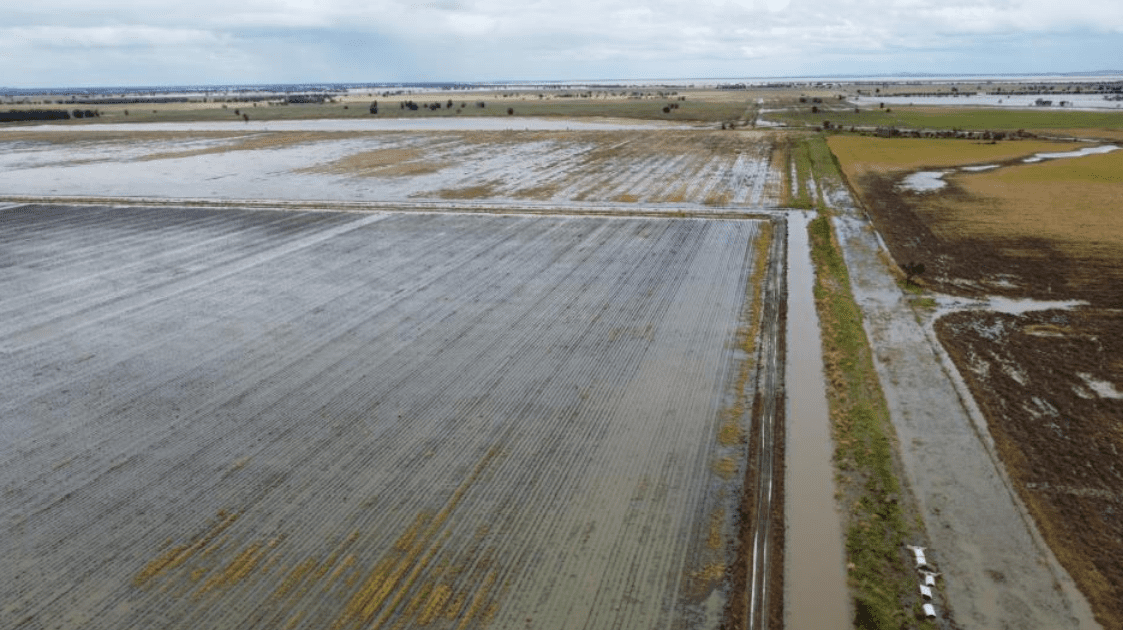
Duxton Farms NSW portfolio is currently waterlogged and big crop losses are expected. Photo: Duxton Farms
ASX-LISTED Duxton Farms has signaled its intention to further diversify its holdings as the company faces a dire winter harvest and a virtually non-existent 2022-23 summer crop.
Duxton owns 22,882 hectares of mixed-farming land located in the flood-hit Central West of New South Wales, and recently announced leases of an 1185ha farm in Piambie, Victoria and a 141,000ha cattle station in the Northern Territory.
The NSW aggregation produces wheat, barley, canola and cotton as well as fodder crops, and also runs some livestock.
This is the second consecutive disappointing winter-crop harvest for Duxton, with the 2021 harvest producing about 37,000t of grain compared with 60,000t in the previous seasons.
Duxton Farms chair Ed Peter said while the results of the previous season were frustrating, the current flooding in NSW and the impact on operations and staff is devastating.
“Duxton Farms are witnessing an event of historical, biblical proportions,” Mr Peter said during the company’s annual general meeting last week.
“It looks like both in Forbes and further down the river near some of the other assets…we are going to see flooding levels that beat 1954.
“So when we talk about biblical levels of water, this you cannot make up; it is truly absurd.”
He said flooding has halted farming operations and left many staff members trapped on properties.
Duxton Farms’ operations team general manager Bryan Goldsmith was one of these employees who was unable to leave his “island in Forbes”.
He said the team was able to save all the livestock, but could do little to prevent crop losses.
“Frustratingly large portions of the aggregation are currently under water and the harvest of the remaining crop has not commenced yet,” Mr Goldsmith said.
“The wet start to the season greatly limited the area sown, with only about 50 per cent of the planned areas planted equal to 7793ha.
“Flooding has since reduced the harvestable area to about 3172ha.”
Mr Goldsmith said some areas of wheat have already been baled for hay or silage.
He said the prolonged flooding has also meant that no cotton has been planted for picking in 2023.
“The extremely wet conditions in late September and early October resulted in no new-season cotton being planted.
“This turned out to be a blessing in a way, as the entire area that we were planning on planting to cotton has since been flooded and the crop would have been lost.”

The devastating 2022-23 season comes after a disappointing 2021-22 harvest. Source: Duxton Farms
Investing outside NSW
Mr Peter said this season’s results, on top of those from 2021-22, have made Duxton Farms more committed to diversify outside NSW.
He said Duxton Farms invested in Central West NSW as the region was considered to be under-valued over the past five years; however, this concentration has also exposed the company “to some operational risks”.
He said the company was pleased with the capital gains from that aggregation, and was now looking at further investments outside NSW.
Mr Peter said the Victorian and Northern Territory leases are first steps for Duxton Farms.
“There are a number of other projects that we are accessing, and I will be sure to expand on future communications to the market.”
NT cotton trial
Mr Peter said the new leases are also providing opportunities for Duxton Farms to expand its income streams, via a proposed cotton trial at the NT operation and the plans to capitalise on the growing carbon market.
He said the company believed the Mountain Valley Station operation in the NT could be an ideal location for a cotton crop.
“Initially the company will focus on restocking Mountain Valley…but we will look to develop a cotton trial in time, aided by Mr Goldsmith’s significant cotton experience.”
Currently there have been limited cotton trials in the Roper region, where Mountain Valley is located; a neighbouring station is currently undertaking a trial on a 50ha plot.
Alongside cotton, Duxton has also indicated it will be looking to convert grazing land to dryland cropping to increase the operation’s production of fodder crops such as millet, lucerne and sorghum.
Soil-carbon opportunities
Mr Peter said Duxton Farms other new lease acquisition, Piambie, also offered another new capital-gain opportunity through the emerging soil-carbon market.
“The asset is in a climatic zone that allows for many different options around permanent crops, it has great water access, and we think there could be a good story around soil carbon over permanent crops on that asset, noting that if we take a grain farm and transition it to a permanent crop asset, there is a huge uplift in the value of the land.
“Piambie as an asset clearly washes its face as a grain farm and has an appropriate return on capital deployed, but if we can transit, it will do well beyond that.
“We are exploring a couple of different options.”
He said the company was also currently in the process of lodging a soil-carbon project, but did not elaborate by saying where this development would be located.
Grain Central: Get our free news straight to your inbox – Click here



HAVE YOUR SAY